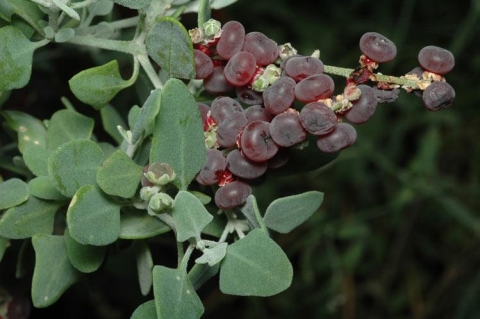Rhagodia spinescens
R.Br.
Amaranthaceae
It has been proposed by Fuentes-Bazan, S. Et al. 2012 'Towards a species level tree of the globally diverse genus Chenopodium (Chenopodiaceae)' in Molec. Phylogenet. Evol. 62:372 that the genus Rhagodia should be merged with the genus Chenopodium. This has not as yet (2015) been fully accepted and so, for the time being, we are continuing to use Rhagodia. If the changes are accepted, then this species will become Chenopodium spinescens (R.Br.) S.Fuentes & Borsch[
K- Title
- Plants for a Future
- Author
- Ken Fern
- Description
- Notes from observations, tasting etc at Plants For A Future and on field trips.
].
Chenopodium spinescens (R.Br.) S.Fuentes & Borsch
Rhagodia deltophylla (F.Muell.) A.J.Scott
Common Name: Spiny Saltbush
General Information
Spiny saltbush is an intricately branched, often spiny, evergreen shrub growing up to 3 metres tall.
The edible leaves and fruit are sometimes harvested from the wild for local use.
Known Hazards
None known
Botanical References
Range
Australia - all mainland states.
Habitat
Dried river beds in sandy clay and clay soils[
].
Properties
| Edibility Rating |      |
| Habit | Evergreen Shrub |
| Height | 2.00 m |
| Cultivation Status | Wild |
Cultivation Details
Mainly found in warm temperate areas, the plant does just find its way into the tropics. It is usually found in drier areas.
Requires a sunny position and a well-drained soil.
The plant responds well to trimming[
K- Title
- Plants for a Future
- Author
- Ken Fern
- Description
- Notes from observations, tasting etc at Plants For A Future and on field trips.
].
Edible Uses
Young leaves - cooked. A salty flavour[
144- Title
- Wild Food in Australia.
- Publication
-
- Author
- Cribb. A. B. and J. W.
- Publisher
- Fontana
- Year
- 1976
- ISBN
- 0-00-634436-4
- Description
- A very good pocket guide.
].
Fruit - raw. Sweet and palatable[
144- Title
- Wild Food in Australia.
- Publication
-
- Author
- Cribb. A. B. and J. W.
- Publisher
- Fontana
- Year
- 1976
- ISBN
- 0-00-634436-4
- Description
- A very good pocket guide.
].
Medicinal
None known
Other Uses
None known
Propagation
Seed - sow spring in a greenhouse and only just cover the seed. Germination should take place within a week, prick out the seedlings into individual pots when they are large enough to handle and plant them out after the last expected frosts.
If you have any useful information about this plant, please leave a comment. Comments have to be approved before they are shown here.







 Useful Tropical Plants Database 2014 by
Ken Fern,
web interface by
Ajna Fern
with help from
Richard Morris.
Useful Tropical Plants Database 2014 by
Ken Fern,
web interface by
Ajna Fern
with help from
Richard Morris.